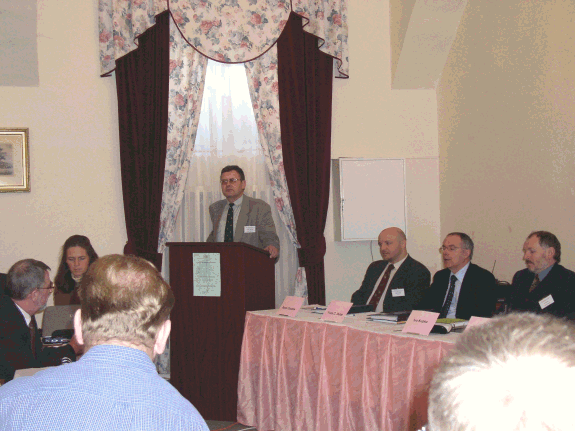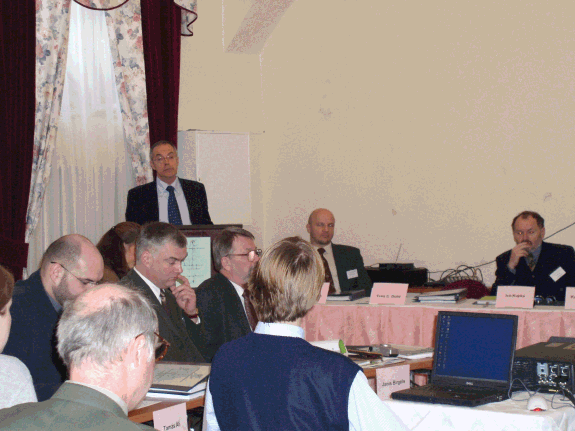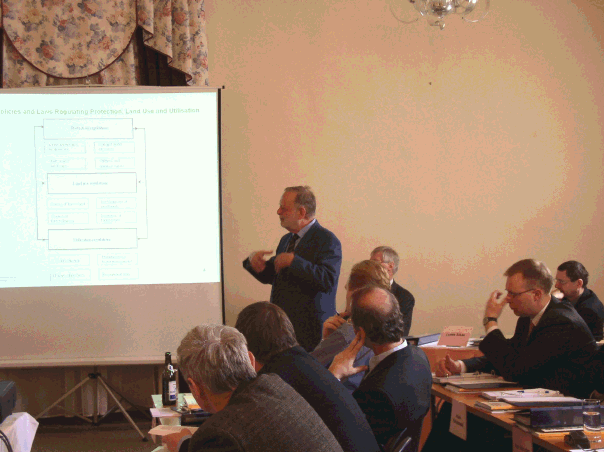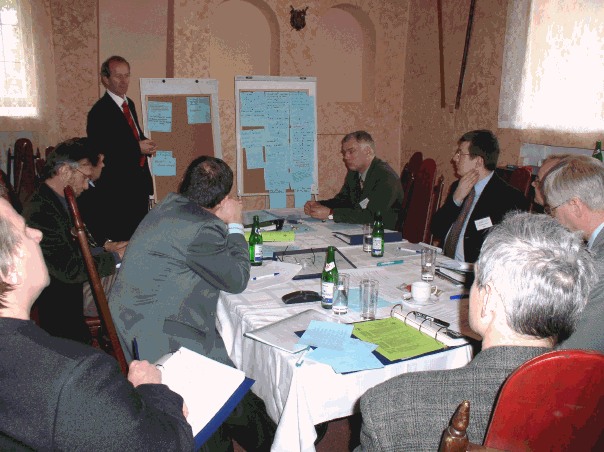

Group work sessions and plenary discussions
Phase 1: Reaching consensus on priority issues
Phase 1: Priority issues at regional and national levels
Phase 2 - Solutions and actions for selected priority issues
FAO Forestry Department organized, in collaboration with the Ministry of Agriculture of the Czech Republic and the "Forest of the Czech Republic"- State Enterprise, Forestry Policy Workshop with the theme "Trends in Forest Use and Conservation - Policy Options for Action, held from 21 to 26 March 2004 in Turnov - Hrubá Skála.
The purpose of the forestry policy workshop was to review current and emerging issues facing the development of the forestry sector in Central and Eastern Europe (CEE), discuss policy implications and identify practical policy options for action (for more details see the workshop rationale). To enable the exchange of information and experiences among CEE countries, the participants were requested to prepare Country Issue Reports and make them available before the meeting.
Twenty country delegates from twelve CEE countries (Bosnia and Herzegovina, Bulgaria, Czech Republic, Estonia, Hungary, Latvia, Lithuania, Poland, Romania, Serbia and Montenegro, Slovakia, Slovenia and Ukraine) participated in the workshop. In addition, observers from the European Forest Institute, Ministerial Conference for the Protection of Forest in Europe Liaison Unit, METLA (Finnish Forest Research Institute), Fulbright Exchange Program in Ukraine, as well as speakers from Indufor Oy, Swiss Federal Institute of Technology Dept. of Environment Sciences, Czech University of Agriculture Dept. of Economics and Forest Management, IUCN Office for Central Europe, FAO HQs and Sub-regional Office for Europe attended the workshop (see List of participants). In total 30 participants from 16 countries came together to Hrubá Skála to share their experiences, exchange ideas, review current and emerging issues in forestry and identify strategic actions toward sustainable forest use and conservation.
The opening ceremony started at 10h00 and was chaired by Mr. Ivo Kupka, Faculty of Forestry and Environment, Czech University of Agriculture.

Mr. Karel Vancura opened up the workshop, on behalf of the Czech Ministry of Agriculture, welcoming participants, recalling the main purpose of the forestry policy workshop and issues the CEE forest sector is facing, stressing the importance of cross-sectoral linkages.
On behalf of Mr. Hosny El-Lakany, Assistant Director General of FAO Forestry Department, Mr. Yves C. Dubé thanked the Government of the Czech Republic for sponsoring the workshop, congratulated the organizers for the excellent choice of the venue, and recalled the outputs expected at the end of the workshop.

The panel session started at 11h00, after the group picture, and was chaired by Mr. Ivo Kupka. The following six presentations were made:
· Policy implications and options of regional trends in forest use and conservation by Tuomo Kotimäki, Indufor Oy
>> PAPER | PRESENTATION· Need for cross-sectoral policy coordination by Franz Schmithüsen, Dept. of Environment Sciences, Swiss Federal Institute of Technology
>> PRESENTATION· Environmental and economic accounts for forestry by Yves C. Dubé, FAO Forestry Policy and Institutions Service
>> PRESENTATION· Promotion of environment services by Ludek Sisak, Czech University of Agriculture, Faculty of Forestry and Environment
>> PAPER | PRESENTATION· Results of biodiversity conservation projects by Piotr Tyszko, IUCN CEE Sub-regional Office
>> PRESENTATION· Summary Results of EFSOS and implications for CEE countries by Volker Sasse, FAO Sub-regional Office for Europe (on Tuesday Morning March 23, 2004)
>> PRESENTATION

The chairperson opened the floor for discussion after all presentations were finished. Some of the main questions or ideas raised/expressed were:
The facilitator, Nathalie Debroux, introduced the overall group work approach and methodology, and explained brainstorming principles. Participants then parted into three separate rooms to start their work which entailed the following three phases:
Phase 1: Reaching consensus on priority issues
Phase 2: Searching for solutions and actions
The following outputs were produced:
The focus question for this working session was: "What are the main problematic topics (priority issues) that the forestry sector has to face?" The participants in each sub-group were asked to first think individually, secondly agree or vote on priority issues at regional level, and thirdly prepare and present a summary of all their ideas in plenary session. Participants identified some 114 issues at regional level. These were further ventilated into twelve categories of issues. Twenty-two issues were singled out as being critically important for sustainable forest management in the sub-region (see Table 1).
Participants were also asked to identify emerging and established issues at their respective national level (see Table 2), and discuss among themselves differences and similarities between national and sub-regional levels.
These results show clearly that cross-sectoral, economic, policy and legal aspects were among the main categories of issues to which participants gave the highest priority. Though the process of privatization of public forests is important in many countries of the sub-region, participants did not single it out as a priority issue. Communication was stressed on the other hand as an important mean to tackle all priority issues, in particular those dealing with multi/cross-sectoral aspects. The three issues marked by a star in Table 2, were the most voted priority issues at regional level. The results of phase 1 are presented in detail in annex 1 and in annex 2.
Category of Issue and No. of votes in bracket |
No. of Identified Issues/Category |
No. of Voted Issues/Category | ||
Multi-sectoriality (6) |
14 |
4 | ||
Policy and law (6) |
15 |
4 | ||
Economic (4) |
3 |
1 | ||
Communication (2) |
14 |
3 | ||
Finance and investment (2) |
9 |
2 | ||
Promotion of wood and non-wood products and services (1) |
3 |
1 | ||
Institution and capacity (1) |
7 |
|||
Forest and forestry |
10 |
3 | ||
Biodiversity (1) |
3 |
1 | ||
Social functions |
3 |
|||
Innovation in wood industry sector |
5 |
1 | ||
Education, training and research |
8 |
1 | ||
Public awareness |
4 |
1 | ||
Private forestry |
11 |
|||
Support to sustainable Private forestry |
5 |
|||
Issues deemed most important for SFM are (number in bracket = number of votes received):
1. Improving economic viability of the forest sector (8)
2. Implementation of cross-sectoral responsibility for forests and forestry issues (5)
3. Balancing private owner's and public interest on biodiversity conservation (4)
4. Long term vision: strategic planning on priorities, functions (control and management) - strategic planning in accordance with biodiversity conservation, increase land cover (3)
5. Development of the European forest fund with the aim of faster development of forestry in countries in transition (2)
6. Promotion of SFM (2)
7. Balance between forest use and nature protection (2)
8. Lack of inter-sectoral institutions/mechanisms to coordinate (2)
9. To recognize the cross-sectoral nature of SFM (1)
10. Forest clusters = cross-sectoral approach (1)
11. Rural development (1)
12. The forest policy is not a main policy in the general economic development policy for the country (1)
13. Improving image and profile of the forest sector (1)
14. Low importance of forestry (1)
15. Collaborative partnership in solutions of emerging issues; foresters vs green NGOs and criticism without responsibility or responsible joint solution of ... (1)
16. Lack of financial resources for the forest sector (1)
17. Wood promotion (from forest owner up to final consumer of wood products) (1)
18. Balancing biological and economic part of forest management (1)
19. Biodiversity (habitats) protection (1)
20. Increase competitiveness wood processing and trade/export (1)
21. Insufficient development of human resources both in (management and society) in term of SFM (1)
22. Promotion of wood in people's mind as a ecological advantageous product (1)
Issues |
Emerging |
Established |
Financial resources for forestry |
Bulgaria Slovakia Romania Estonia |
|
Investments in forestry sector |
Ukraine Switzerland | |
Improving image and profile of the forest sector |
Hungary Slovakia |
|
Forest management in private forests |
Serbia |
Hungary |
* Balancing owner's and public interest in forest use |
Latvia |
|
Low share of forested lands and fragmentation of forest |
Poland | |
* Implementation of cross-sectoral responsibility for forest and forestry issues |
Czech Republic Latvia, B - H |
Lithuania |
* Improving economic profitability of the forest sector |
Poland Finland |
Ukraine, Slovakia |
Long-term vision - strategic planning, priorities, functions |
Serbia |
B - H Ukraine |
Insufficient capacity of human resources both in management and society in term of SFM |
Latvia Serbia | |
Balance between forest use, commercial forestry and nature protection/conservation |
Bulgaria |
Romania Finland |
Development of the forest institutions and capacity |
Bulgaria Serbia | |
Improvement of communication between agencies responsible for forests, nature protection, state civil service, private forestry sector and media |
Czech Republic |
The participants were again divided into three working groups. Each group selected one of the three following priority issues, identified corresponding ideal solutions and proposed actions to implement them, highlighting critical and driving forces:
Each group's findings were shared, discussed and they are summarized hereafter. The importance of carrying out all solutions or actions in the framework of the pan-european national forestry programme was stressed.

Group 1 dealt with the issue Improving economic viability of forestry sector and proposed the following main solutions and actions to implement them:
Group 2 searched for solutions and actions for the issue Implementation of cross-sectoral responsibility for forest and forestry sector and proposed following solutions and actions:
Group 3 addressed the issue of Balancing private owners' and public interest in use of forests came-up with following solutions and actions:
Using Pan-European approach to NFP as overall framework:
To implement these solutions following actions were recommended:
The results of phase 2 - searching for solutions and concrete actions for selected priority issues are presented in detail in annex 3.
The facilitator opened the last session of the meeting - identification of follow-up actions, and invited participants to make proposals for follow-up actions and the next workshop.
All participants considered the workshop as an excellent opportunity to share and discuss their ideas and experiences, get a broader perspective, and look for differences and similarities in addressing forestry issues and search for solutions at regional level. Participants have now the challenge to translate the results of the workshop and implement them at national level.
They expressed a need to cooperate more between themselves and to exchange more information on their problems, progress made in particular areas or on how did they resolve the problems and with which results.
Participants recommended that FAO facilitate these exchanges and suggested to use the FAO website for this purpose. The possibility of adding comments (results/information on follow-up actions, links, and contacts) to the workshop documents posted on FAO website was considered. This could serve also as a monitoring tool to asses the interest of participants to maintain the network active.
To maintain the network alive, they also recommended to organize other meetings/facilitated workshops and to inform each others about relevant country events.
They finally recommended to consider a multilevel approach and to include other stakeholders in next workshops (private owners, policy makers, industry,...). As this kind of workshop would be difficult to organize at regional level, it was suggested to organize them at national level. The FAO was requested to support and facilitate the organization of such workshops through TCP and other programs.
The following themes were suggested for next workshops: